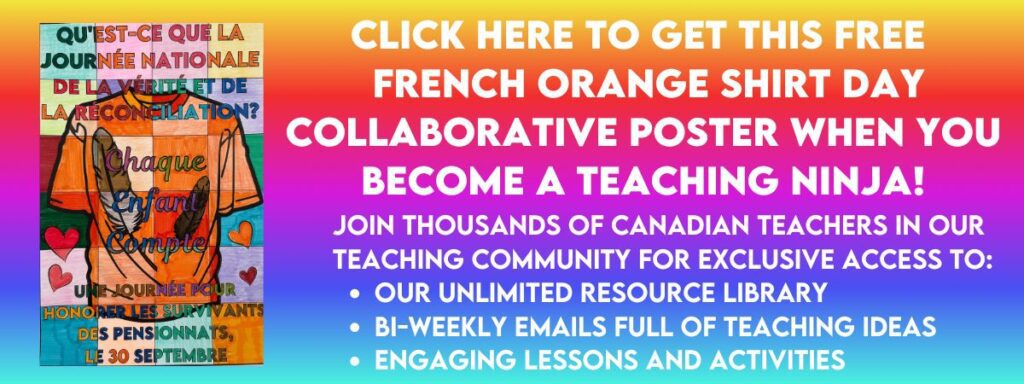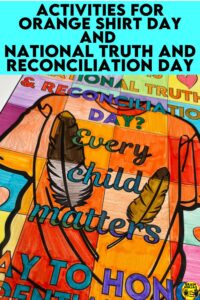
Orange Shirt Day is recognized each year on September 30. Check your local area for activities so you can participate in acknowledging Residential School survivors. As of 2021, the Canadian government has declared September 30 a day of National Truth and Reconciliation.
It is important to educate everyone about Canada’s wrongs so we can learn from them. We need to repair the damage that has been done. We have searched out some student-friendly resources teachers can use in their classrooms to teach students about Residential Schools because Every Child Matters. Keep reading to get a list of resources you can use in your classroom.
What is Orange Shirt Day?
Orange Shirt Day is a day to think about the many students who were taken from their families to be colonized. Students placed in Residential Schools were not allowed to speak their native languages, practice their spiritual beliefs, wear their own cultural outfits, or even wear their hair as their ancestors did. The purpose of Residential Schools was to “kill the Indian.” It was cultural genocide.
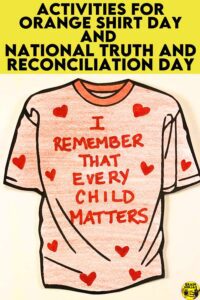
Students had trouble returning to their communities when their schooling was finished (if they survived). They did not speak the language or know the people. Entire families and communities were wiped out. And those students who survived were considered lucky just to have survived. Many students never returned home after dying at the schools.
Phyllis Webstad (nee Jack) started Orange Shirt Day. Excited to go to her new school, she bought a new orange shirt to wear for the first day of school. Upon arriving at school, her new shirt and all her other belongings were taken away and never given back. That orange shirt now symbolizes remembering the wrongs that all students in Residential Schools endured.
Orange Shirt Day is more important than ever after the confirmation of bodies found at the Kamloops Residential School on Tk’emlúps te Secwépemc land. While 215 is the number many are mourning, we all know there are many more. Currently, thousands have been located, and the process continues. We need to stay committed to finding them all.
National Day of Truth and Reconciliation
In June 2021, the Canadian government passed legislation to declare a “National Day for Truth and Reconciliation,” to be observed on September 30, beginning in 2021. It fulfills the Truth and Reconciliation Commission of Canada’s Call to Action #80: “to establish, as a statutory holiday, a National Day for Truth and Reconciliation to honour Survivors [of Residential Schools], their families, and communities, and ensure that public commemoration of the history and legacy of residential schools remains a vital component of the reconciliation process.” Therefore, the acknowledgement of this day is important to teach to all students in Canada.
Should teachers teach about Residential Schools?
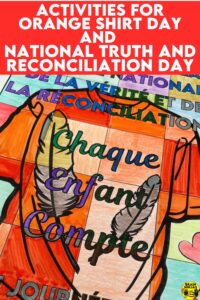
Absolutely. Students should know our collective history. All of it. It is our chance to learn from mistakes.
Teachers need to approach the subject tenderly, honestly, and with age-appropriate information. We need to teach this content while we wait for provincial and territorial governments to rewrite curricula to include Residential Schools from kindergarten through Grade 12.
Remember that your students may be new to learning about Residential Schools. We ask that you preview all materials you plan to use. Think about how you will answer tough questions – like the different types of abuse students suffered – so that you have answers prepared for the learning age and maturity of your students.
While it is important to be honest with students, it is also important to give them age-appropriate answers. Avoid “sanitizing” the truth. Not speaking the truth is part of the reason Residential Schools and their history has been so unknown to most Canadians.
Education is one of the calls to action from the Truth and Reconciliation Commission. You can read all the calls to action here.
What resources are available to teach students about Residential Schools?
Here are some materials we’ve located for elementary-aged children.
First Nations Child & Family Caring Society of Canada: The materials on the bottom portion of the page are best for young students.
Phyllis’s Story: The Original Story About Orange Shirt Day
St. Joseph’s Residential School Stories: A YouTube Video
And we found this video was one of the ones our students responded to. Every Child Matters
What are some books to read to and with students about Residential Schools?
Ask your local librarian to search for these books so they can be part of your school library. Many are available online. Some have recordings of the authors reading them. Please only use the audio versions created by the authors. This way, authors and publishers get paid for their hard work.
Our booklists do not include affiliate links. We encourage you instead to shop at your local bookstore. Ask them to bring in more diverse books for the members of your community. Shopping locally is also good for the environment and supports your local economy.
For younger students:
- When I Was Eight by Christy Jordan-Fenton and Margaret Pokiak-Fenton
- Arctic Stories by Michael Kusugak
- Kookum’s Red Shoes by Peter Evyindson
- I Am Not a Number by Jenny Kay Dupuis and Kathy Kacer
- Shi-shi-etko by Nicola Campbell
- Shin-chi’s Canoe by Nicola Campbell
- Stolen Words by Melanie Florence
- When We Were Alone by David Alexander Robinson
- Phyllis’s Orange Shirt by Phyllis Webstad
- The Train by Jodie Callaghan
- I’m Finding My Talk by Rebecca Thomas
- Little Butterfly Girl: An Indian Residential School Story by the Anishinabek Nation
For older students:
- The Orange Shirt Story by Phyllis Webstad
- The Secret Path by Gord Downie and Jeff Lemire
- Fatty Legs: A True Story by Christy Jordan-Fenton and Margaret Pokiak-Fenton
- A Stranger at Home: A True Story by Christy Jordan-Fenton and Margaret Pokiak-Fenton
- No Time to Say Good-bye: Children’s Stories of Kuper Island Residential Schools by Sylvia Olsen
- As Long as the Rivers Flow by Larry Loyie
- My Name is Seepeetza by Shirley Sterling
- Dear Canada: These Are My Words by Ruby Slipperjack
- They Called Me Number One by Bev Sellars
- Sugar Falls: A Residential School Story (Graphic Novel) by David Alexander Robinson
- Red Wolf by Jennifer Dance
- Totem by Jennifer Maruno
- Good For Nothing by Michel Noel
- The Red Files by Lisa Bird-Wilson (poetry)
- The Boy Who Walked Backwards by Ben Sures
- I Lost My Talk by Rita Joe
- Ends/Begins by David Alexander Robertson
- The Marrow Thieves by Cherie Dimaline
- Orange Shirt Day by Orange Shirt Day Society (published by Orca Publishers or Medicine Wheel Education)
- Memory Keeper by Dawn Cheryl Hill
- Dreamfast: A Trail of Stories to Lead You Home by Elizabeth Doxtater
More Learning For Teachers:
- Truth and Reconciliation in Canadian Schools by Pamela Rose Toulouse
- Speaking Our Truth: A Journey of Reconciliation by Monique Gray Smith
- They Came for the Children by The Truth and Reconciliation Commission of Canada – You can find this document on this webpage.
- Behind Closed Doors: Stories from the Kamloops Indian Residential School by Jack Agnes
- Residential Schools, With the Words and Images of Survivors: A National History by Larry Loyie, Wayne K. Spear, and Constance Brissenden
- Calling Down the Sky by Rosanna Deerchild
- Northern Wildflower by Catherine Lafferty
- Mamaskatch by Darrel McLeod
- They Called Me Number One by Bev Sellars
- A National Crime The Canadian Government and the Residential School System from 1879 to 1986 by John S Malloy
- Beyond the Orange Shirt Story by Phyllis Webstad
- Indigenous Peoples Atlas of Canada by the Royal Canadian Geographic Society
- Broken Circle by Theodore Fontaine
- Indian School Road: Legacies of the Shubenacadie Residential School by Chris Benjamin
- Up Ghost River: A Chief’s Journey Through the Turbulent Waters of Native History by Edmond Metatawabin and Alexandra Shimo
What are some other activities that can be done to observe Orange Shirt Day?
- Wear orange shirts.
- Hold an assembly. Do this online if you cannot be together.
- Have door greeters ask students to sign a pledge to always remember.
- Get students to decorate orange shirts and wear them for the event.
- Hold a drum circle. Watch one online if you cannot be together.
- Have students learn about Residential Schools and tell others what they’ve learned.
- Paint rocks in remembrance of the children who never came home.
- Invite your local Elders to come to talk about their experiences.
- Invite Residential School survivors to share their stories. Here is some useful information about how to go about that and what you should know before making contact.
- Read a book.
- Read some of the calls to action from the Truth and Reconciliation Commission of Canada. Look to see what you and your students can commit to doing. We recommend sending letters to our government leaders asking for their support for Indigenous People. In particular, look at the calls to action related to health and education.
- Fundraise to support a charity that supports Residential School survivors and their families.
- Take a moment to think about how we can support Indigenous People across Canada now.
- Visit First Nations Child & Family Caring Society for educational resources for your class.
- Use educational resources from the National Centre for Truth and Reconciliation.
- Create awareness. Use this collaborative poster to inform others to wear their orange shirts on September 30. We’ll send the poster to you for free when you sign up for our email list. It can also be found in our Resource Library.
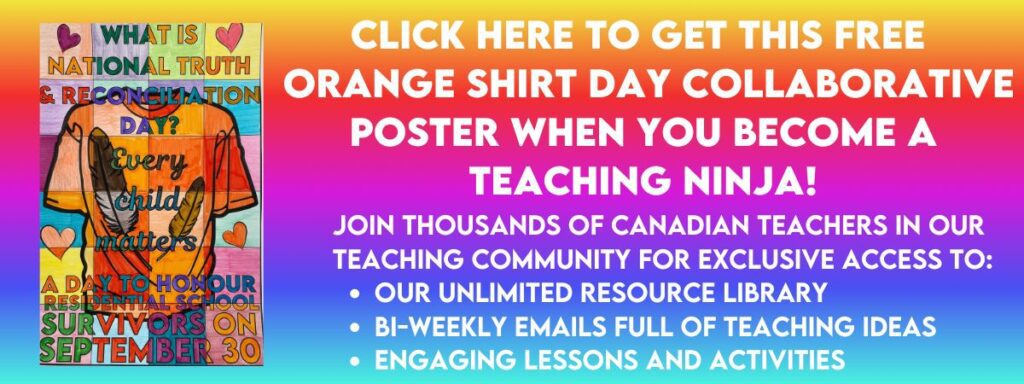
We also have the poster available in French.
Learn About Indigenous People in the Past and the Present
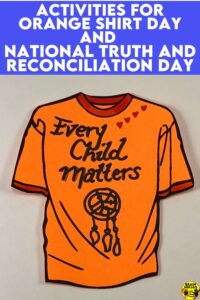
We’ve created a few simple pages you can use with your students. You can find them in our TpT Store or BN Shop for free. Students can make paper orange shirts. They can make a pledge to remember.
Last year, every student in our school made a paper shirt. We covered a whole wall with the pledges. It was very moving to read all the comments and look at everything students wrote and drew. They definitely learned a lot about Residential Schools and their impact on our world today. Most promised to never allow Residential Schools to open again. Several wanted to learn more about Indigenous People to feel more connected to them.
We try to teach our students about Indigenous culture all year round. If you’re looking for more ideas, you can check out this blog post: Bring Indigenous Culture into Your Lessons.
More Activities for Orange Shirt Day (or any time of year)
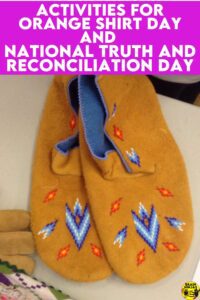
With your orange shirts on, go for a walk around your neighbourhood. If your school is in an area where there might be a chance to educate others, have your students do the talking and educating. People listen to kids. Let them use their voices.
Have you heard of or participated in the Kairos Blanket Exercise? It is an eye-opening emotional activity to understand the difficulties faced by the Indigenous People when the Europeans arrived. You can find information on their website.
If these activities are not available to you as an option, you can try this drama circle we created. It is available in our TpT Store ($USD) and BN Shop ($CAN). We wrote it for our students in simple language we knew they would be able to understand. It talks about how life was before the settlers arrived, how life changed after the settlers arrived and why it’s important to move forward through truth and understanding.
Include games and activities that are part of Indigenous culture. An example is this Bone Game. Find it in our Resource Library or we can send you a copy when you join our email list.
Don’t Stop.
All of the above activities are important for honouring and respecting the damage done by Residential Schools, but the work is only just beginning.
Learning about Residential Schools shouldn’t be restricted to a single day or lesson. Students should learn about how Indigenous People have been impacted by colonization throughout the history of Canada. Weave this learning into your history lessons, art lessons, and conversations so that the next generation will know and understand the impact of colonization on the people who called this land home first.
Check out some of our other book lists:
- Books by Indigenous Authors
- Kindness
- Remembrance Day
- Ramadan
- Poetry Books
- Books for Holi Festival of Colours
- Christmas Books We Love
- Lunar New Year
- Books to Teach Social Emotional Learning
- Cozy Up With Great Winter Books
- Books for Asian History Month
- Books You’ll Love With LGBTQ+ Characters
- Black History Books
- Earth Day
- Thanksgiving
- Books For and About Powerful Women
Do you have other ideas of how you’ve observed Orange Shirt Day? Let us know in the comments below and we’ll add them to our list.

